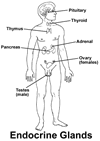Both the nervous system and the endocrine system are involved in regulation and co-ordination of the body.
The effect of the nervous system is usually to bring about an immediate, short-term, localised response to change, such as blinking to prevent eye damage. Communication in the nervous system is via very rapid electrical messages.
Seasonal changes such as the onset of winter, however, require a more long term and widespread response throughout the whole body. This may require physiological, structural and behavioural responses, such as storing more body fat, growing longer fur, and maybe hibernation or migration. In such instances, chemical messages are far more efficient than a continual barrage of electrical impulses.
Hormones
The endocrine system is made up of endocrine glands which are specialised
tissues producing chemicals called hormones.
A hormone is a compound produced in minute quantities in one part of the body and transported via the bloodstream to another area where it exerts its effect.
Hormones regulate internal body functions such as reproduction, growth, metabolism (the rate of chemical reactions) and homeostasis (the maintenance of an optimal internal environment).
Plants also produce chemicals (auxins) which control responses to light, gravity, length of a day, and seasonal changes.
 Endocrine glands
Endocrine glands
The glands of the human endocrine system are: pituitary, pineal, thyroid,
parathyroid, adrenal, gonads (testes and ovaries), placenta, hypothalamus
and the Islets of Langerhans in the pancreas.
Adrenalin
Adrenalin, commonly known as the "fight or flight" hormone,
prepares the whole body physiologically to cope with stress. In emergency
situations, the nervous system stimulates the adrenal glands to release
adrenalin which then travels quickly throughout the bloodstream, having
an effect on target organs which are receptive to the hormone molecules.
This results in a "whole body" co-ordinated response. Adrenalin
increases the blood flow to skeletal muscle in preparation for action,
as well as increasing the heart rate, blood pressure and blood sugar levels
to ensure sufficient oxygen and nutrients for maximum energy.
Testosterone
Testosterone, the male sex hormone produced in the testes, is responsible
for the development of the secondary sexual characteristics in males.
These include the maturation of the reproductive organs, facial and body
hair, the enlargement of body muscles for strength, and promotes sex drive.
Oestrogen and progesterone
Oestrogen is the female sex hormone responsible for the follicle development
in the ovary and development of the female secondary sexual characteristics
(such as breast development). Along with progesterone, it is involved
in the cyclic pattern of ovulation and preparation of the uterus (menstrual
cycle). These hormones are produced in the ovaries, and in the adrenal
cortex, but also in the placenta during pregnancy. Small quantities of
oestrogen are found in males, and similarly testosterone is found also
in females.
Insulin and glucagon
Insulin and glucagon are produced by specialised cells in the pancreas.
These two hormones act together to maintain blood sugar concentration
at a fairly constant level. Insulin is released when blood sugar levels
rise. This lowers the blood sugar by stimulating the uptake and use of
sugar by cells, as well as its uptake and storage by liver cells. Glucagon
stimulates the breakdown of glycogen (a storage form of sugar) thus raising
the blood sugar level. Diabetics who cannot make their own insulin have
high blood sugar which therefore shows up in the urine.
Pituitary hormones
The pituitary is often called the "master gland" because, as
well as producing human growth hormone, it also releases hormones which
control other glands.
| Copyright owned by the State of Victoria (Department of Education and Early Childhood Development). Used with Permission. |